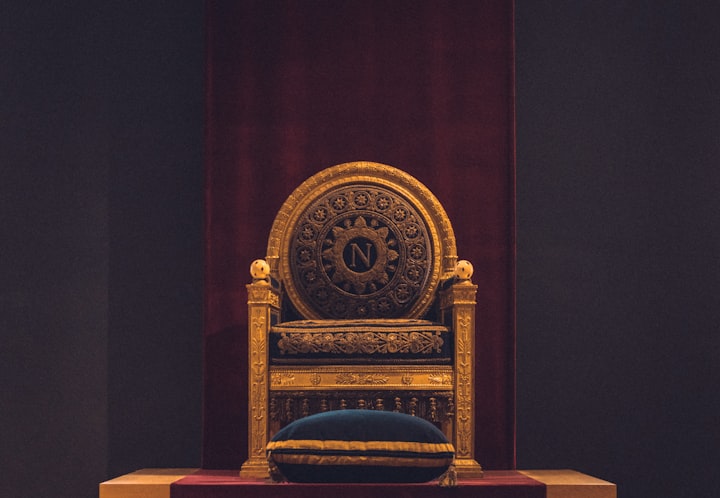
At a time long ago — or long ahead — there stood a man on a ridge high above. The man on the ridge stood alone, but below him were thousands of people. These people were screaming and chanting and singing, proclaiming out the name of the man standing on the ridge. For this man had just become the new king, placed upon the throne by the thousands cheering below him.
The King was determined to be humble, to express gratitude, and to appear to be in complete control of the situation, of his own demeanor, and of his promised future actions. But as he stood there, he realized how difficult a task this would be. The people loved him and he loved that they loved him. And it’s difficult to be composed and measured when those chanting your name are not.
“Ladies and Gentlemen,” the King began, “I stand here completely humbled by your generosity, by your support, and by the love you’ve shown me.”
A good start, thought the King, at least outwardly vocalize that I am indeed humble.
“I’m here to tell you that the support you have for me will not be in vain, that I will deliver all that I said I would, and that I will do all that I can to bring you prosperity, health, and happiness.”
The King’s mental inventory continued within him after each statement he made: maybe a few too many “I’s” in there, he thought after these most recent remarks, but all of the “I’s” ended up leading towards good things for them, so I think I’m still on the right track.
So he continued on, going over the issues of the past and the present and how his goal was to alleviate the people of these issues, and eventually eliminate them all-together. He assured the people that he was going to create for them a better, more prosperous kingdom. But that he would need their help, and most importantly, their continued support, in helping him achieve his goal. Then, he began to conclude his speech…
“Finally, I would be remiss if I did not mention that all of you here are not all of who I am to reign over. I’m aware that there are many within the kingdom who did not support me and who did not want it to be me standing before you today. I know that there were others they wished to be standing here, and that they’re experiencing wounds of defeat. Well, let me be perfectly clear in addressing these people…”
The crowd of people below began to stir, shifting amongst each other. This was their moment. They were expecting, wanting even, the meat to be red, retribution to be placed upon those who doubted them and who doubted the man now standing before them. They were ready for their revenge.
The events leading up to this moment had ripened them for this desire. The campaign for the throne had been a divisive one, one that had separated the people into factions. Factions that had led to attacks made between those vying for the throne and between those supporting those vying for the throne.
But the revenge did not come.
“In addressing them,” the King continued, “I would like to say that my hands are reaching out, that my mind is open, and that my heart is forgiving. Because they too are my people, and I am here to serve them just as much as I am here to serve you.”
The people still cheered these words, but the cheer wasn’t genuine and nor was it enthusiastic. Nothing like the cheers had been during the other portions of the speech.
Because of this the King knew that he needed to provide a little more and end on a strong note. He knew going in that the part about appeasement wouldn’t thrill the people, but he also felt that he had set them up quite nicely.
“However, my dear supporters, take comfort and know that who I was before I stood on this ridge before you all is who I’m going to continue to be from now until the day I die.”
The temporary tension within the people was then relieved and rose out of the crowd. And in its place returned the chanting, the screaming, and the singing.
So the King went home pleased, satisfied with how the event had gone. The temptations had certainly risen within him, ones that caused him to want to sound more militant than he knew he should, to appear as more powerful than what was safe to do, to exude more pride than what was rational for that time.
For of course the King did not mean what he had said about those who hadn’t supported him. And of course, just as his supporters were disappointed and pained to hear him placate and offer the olive branch to their opponents, he was just as disappointed and pained to have said the words that he did.
But he was aware of the game that now needed to be played. He was aware that words would have to be softer than deeds. To begin with anyway. Because, for one, time and space needed to be given to those who might still come over to his side. He and his supporters would gladly welcome those who did, of course not without some ribbing though. A coming over to his side wouldn’t happen immediately, however, and the King knew this well, which is why the soft and appeasing beginning was so necessary.
Some did eventually come over. They found the King to not be near as dangerous as what they believed he would be. In fact, they found him willing to compromise and listen to the ideas opposite his own. “The man is fair and just,” was the main theme being uttered by those who eventually came over to the King’s side. And while some were made to feel somewhat irresponsible for taking so long to see the light, they were ultimately embraced, and some were even made to be knights for the kingdom.
These knights were needed, too, because, as expected, not everyone came over. A unanimous consent submitting to the duly installed King’s will did not come into existence. The kingdom was still fractured and it was still too close to half and half for the King’s liking. He had barely attained the throne because of such numbers and he was constantly afraid of losing it because of them. Some supporters even left his side and went over to the other one. And this changing worried the King, leading to sleepless nights, ones that did not allow him to truly appreciate his winnings.
As a way of fighting back, the King reduced the amount of common citizens and increased the number of knights for his kingdom. The time had come to end the compromises, the placating speech, the extended olive branch. The moment had come to seize instead of appease.
Still, the seizing began gradually. For this was the King’s way, and this is what made him effective. Initially he did not search out the people who outwardly opposed the things he did, but instead he sought after those who lived on the fringes of contemporary life, those who did not conform or comply to any side, the renegades. These were the people who separated themselves completely. They did not live in conventional ways, and not in just their speech and their actions, but also in their thoughts and ideas. These people were the first to go, and not many complained.
—
The progression naturally and eventually led the King to doing away with those who directly opposed him. It had to. The ball had begun to roll and once it hit a certain point, doing away with anyone unhelpful to the King’s will became impossible to stop. This doing away with even reached those whose actions were mostly harmless, their sin mainly being unkind words said about the King. Or even those rumored to have said unkind things. The King was beginning to go as far as he could. The gradualness had eventually reached suddenness.
And yet, he was still garnering support for his actions. He posed his actions as not beneficial for him, but as beneficial for them, his people. This is what they had asked him to do after-all. Put away and silence the opponents, the critics, those who did not conform. Therefore, he was acting on behalf of the people, his people, and was carrying out not his will, but theirs.
However, some of those initial supporters began to look upon the King’s actions with some trepidation. These few began to wonder if they’d made a mistake, if they’d gotten too carried away with the emotions of an us versus them approach, and they became more and more aware of the fact they were being played by the King.
The King had gained the throne with their help, but then had he ever so slightly taken something away from his supporters by talking of compromises, making the thirst for blood that much stronger and more desirable. And so when the blood finally came, the supporters who would normally be appalled by the severity of it loved it, because their desire had been pent up and the emotional high that was reached when they got their King to their throne was making a return.
But eventually the high began to whittle away, and so too did the King’s political skill. And while there were still many not privy to this reality, as they continued to carry out and cheer on the King’s will, the few that did become aware began to conspire and strategize. It was time for a new king, one that better represented who they were.
They had to be smart about it, though. They had to start quietly and grow gradually louder and louder and as the numbers behind them grew. They had to essentially manipulate as the King had manipulated.
Slowly, the numbers did begin to grow. The men and women behind the subversive movement were clever and calculated and could be quite persuasive. And their cleverness meant that no blood needed to be shed, no physical revolution begun. As the power-hungry and power-wielding King became less skillful in his maneuvering and more blind to his own pride, he also became unaware of his own self-demise. Leading the people to become ripe in being made aware of the need for change, and eventually convinced of it.
The knights were the last to desert, the final straw for the King. For with no sword he had no power. And with no power he had no authority.
The options, then, were for the King to either fight to defend his throne alongside his few remaining supporters, or to voluntarily vacate his own throne. Not feeling noble or brave enough for certain death, the King chose the latter and left under his own will, what little of it he had left. He retired in exile and was forgotten.
Now, though, there was a vacant throne, and it was incumbent upon the initial leaders of the peaceful rebellion to fill that vacancy.
—
So these leaders got together to discuss their options in choosing a new king. The obvious was hesitantly ignored to begin with but eventually one of them brought it up...
“It should be one of us, shouldn’t it?”
Initially the other leaders were a little shocked by this display of outright honesty, despite knowing that all of them had been thinking the same. So after paying lip service to the potential danger in one of them being the future king, they eventually all agreed with the notion. One of them was to become King.
“We can’t let ourselves become like we were in the past. Sure, we’re going to have to put the choice to the people, as they’ll decide between us. But remember that we’ve got more in common with each other than not and that we mustn’t become divisive and discordant with each other before the choosing takes place.”
“Of course,” was the general and unanimous response to this particular query, as the leaders began to plan out how they could most effectively present themselves as the best choice for the people.
Not all of the leaders decided to go for the throne, however. Some dropped out right away. Others did so quickly after the meeting took place. These that dropped out figured it was best to do so in the interest of not becoming a part of the spectacle they were convinced would take place. For they knew that, despite the agreement for civility, civility would eventually be forgotten.
This is in fact what happened.
The leaders who decided to vie for the throne initially did as they agreed to do, and in unison they laid out to the people their plans for leading them. But then, arguments began to ensue, and it turned out that they were not in complete unison with each other after all. The arguments began small and initially only amongst each other, but then eventually they spilled out before the people.
The people gathered together to witness the arguments, as the leaders engaged in them out in the open. And despite these arguments being ones about how they should best be led, the people enjoyed them nonetheless and watched them with great intrigue.
The people also felt important and flattered. Important because they had a say in not only how they would be led, but also in how their neighbor would be led as well. Flattered because they were being fought over, like two men fighting for the hand of the women they both loved.
So not only did they enjoy the spectacle, they basked in it. And they begged for more.
The leaders, who had once conspired together in bringing about the successful dethronement, now stood directly opposed to each other as they vied for that very same throne. Their present selves completely unrecognizable from their former selves, the throne being what drove this wedge between them.
The wedge led to even newer tactics being utilized by the leaders against one another. It should be said, however, that these new tactics weren’t actually new at all. They were quite old and should have been recognized by the leaders. But the ultimate goal of the throne and the power that went along with it had fogged their memory. For these tactics were of the personal sort, attacks upon the character, the morality, and the integrity of their opponents.
The people also did not recognize. Or they chose not to recognize. And they, too, partook in the assaults, with a sort of twisted zeal. They sided with the leaders they supported and attacked those that they did not. They also engaged in these attacks amongst each other, forming new divisions that resembled the divisions of old. The new future had quickly become the old past.
And so, when the majority of the people’s voice had been heard and the new King was finally installed, it was as if the old King, the one at the beginning of this tale, had reclaimed his throne.
The end.
About the Creator
Mark Metz
Hello! I live in Grand Rapids, Michigan and I'm a freelance writer. I focus mainly on politics, personal growth, and short stories that are typically fantasy or futuristic.
My Substack site: https://markmetz.substack.com/






Comments
There are no comments for this story
Be the first to respond and start the conversation.